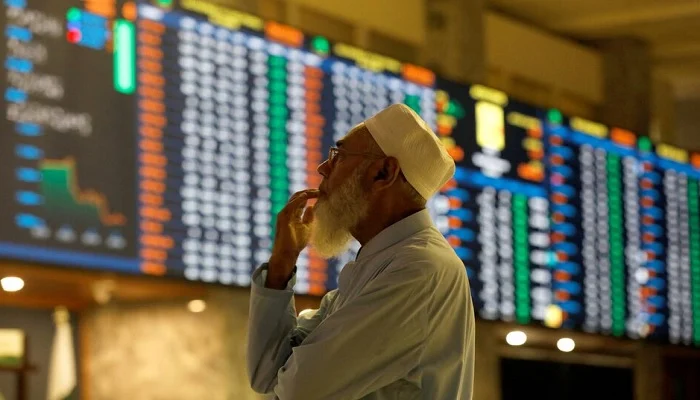KARACHI, April 07: Trading at the Pakistan Stock Exchange (PSX) was halted on Monday after the benchmark KSE-100 Index plummeted by 6,200 points, triggering a market-wide circuit breaker.
The index dropped 5.29% to 112,504.44, marking one of the steepest single-day declines in recent memory and erasing billions in market capitalisation.
The Pakistan Stock Exchange (PSX) witnessed a historic bloodbath on Monday, as the benchmark KSE-100 Index nosedived by over 6,200 points during intraday trading, triggering a market-wide halt.
At 11:58 AM, the KSE-100 was trading at 112,542.56, down by a staggering 6,249.10 points or 5.26%, marking the largest single-day intraday decline in point terms in PSX history, according to Arif Habib Limited (AHL).
The market halt was enforced in accordance with PSX regulations after the KSE-30 Index dropped more than 5%, pausing all equity and equity-based trading for 60 minutes, from 11:58 AM to 12:58 PM.
As part of the halt, all outstanding orders were also automatically cancelled, the PSX confirmed in an official notice.
Broad-Based Selloff Hits Key Sectors
A wave of panic selling swept through the market, dragging down major sectors including:
-
Cement
-
Commercial Banks
-
Oil and Gas Exploration
-
Oil Marketing Companies (OMCs)
-
Refineries
-
Power Generation
Heavily-weighted stocks such as HUBCO, ARL, MARI, OGDC, PPL, POL, PSO, SNGPL, SSGC, and HBL all traded deep in the red, contributing significantly to the market rout.
According to Sana Tawfik, Head of Research at AHL, the selloff was primarily driven by fears stemming from the U.S.-China trade war escalation and a sharp decline in global oil prices.
However, she expects the decline to be temporary, noting the upcoming earnings season could help stabilize investor sentiment.
This dramatic downturn follows a positive week at the PSX, where the KSE-100 Index had gained 984 points (0.84%), closing the previous week at 118,791 points, buoyed by optimistic economic signals.
Global Markets in Chaos Amid Trade War and Recession Fears
The turmoil in Pakistan mirrored broader global market distress, as Asian and European markets also suffered steep losses on Monday.
The chaos was triggered by the U.S. administration’s unwavering stance on tariffs and China’s retaliatory measures, fueling fears of a global recession.
-
S&P 500 futures plunged 3.1%, and Nasdaq futures dropped 4.0%, adding to the nearly $6 trillion wiped off U.S. markets last week.
-
European futures also took a beating, with EUROSTOXX 50 down 3.0%, FTSE off 2.7%, and DAX sliding 3.5%.
-
In Asia, Japan’s Nikkei lost 6%, South Korea fell 5%, and Chinese blue chips dropped 4.4%.
-
Taiwan’s TWII index, reopening after a two-day holiday, tumbled nearly 10%, prompting regulators to impose restrictions on short-selling.
The flight to safety pushed U.S. Treasury yields sharply lower, with investors now pricing in up to five rate cuts by the Federal Reserve this year. The dollar also weakened against major currencies, including the Japanese yen and Swiss franc.
Oil Slumps Further on Recession Worries
Oil markets extended their slide, weighed down by fears that a prolonged trade conflict could drastically curb global demand:
-
Brent crude dropped by $2.28 (3.5%) to $63.30 per barrel.
-
WTI crude fell $2.20 (3.6%) to $59.79, both reaching their lowest levels since April 2021.
The situation was further compounded by expectations of increased supply from OPEC+, with member states under pressure to comply with agreed output targets.
Outlook: A Volatile Road Ahead
The global market panic and its reverberations in Pakistan underscore how deeply interconnected financial markets have become.
While analysts expect a partial recovery in the PSX as earnings season unfolds, the macroeconomic uncertainties — especially those stemming from geopolitical tensions and global trade disruptions — are likely to keep volatility elevated in the weeks ahead.
